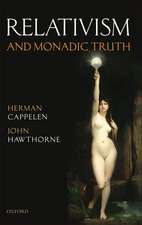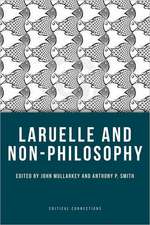Man as a Place of God: Levinas' Hermeneutics of Kenosis: Amsterdam Studies in Jewish Philosophy, cartea 13
Autor Renée D.N. van Riessenen Limba Engleză Hardback – 8 aug 2007
The focus of interpretation is the hermeneutics of ‘kenosis’: the subject’s ability to be open towards the other to the point where man can be seen as a place of ‘God’, a place where the infinite attains to finite existence. Does this mean that the kenotic subject totally disappears from the arena of his own life, to reach out for a sublime existence that is no longer of ‘this world’ – as in the philosophy of Plato, Plotinus and certain mystical thinkers? This book will argue the reverse: the kenotic sublimity developed by Levinas is in keeping with ethics, and even with concrete acts of responsibility. Also, it refers to a certain idea of God, who comes into being in a ‘kenotic’ way: by giving himself in the ethical experience of man and woman, regardless of their culture and religious beliefs.
| Toate formatele și edițiile | Preț | Express |
|---|---|---|
| Paperback (1) | 886.92 lei 6-8 săpt. | |
| SPRINGER NETHERLANDS – 25 noi 2010 | 886.92 lei 6-8 săpt. | |
| Hardback (1) | 892.90 lei 6-8 săpt. | |
| SPRINGER NETHERLANDS – 8 aug 2007 | 892.90 lei 6-8 săpt. |
Preț: 892.90 lei
Preț vechi: 1088.90 lei
-18% Nou
Puncte Express: 1339
Preț estimativ în valută:
170.85€ • 178.87$ • 141.37£
170.85€ • 178.87$ • 141.37£
Carte tipărită la comandă
Livrare economică 05-19 aprilie
Preluare comenzi: 021 569.72.76
Specificații
ISBN-13: 9781402062278
ISBN-10: 1402062273
Pagini: 228
Ilustrații: VIII, 217 p.
Dimensiuni: 155 x 235 x 22 mm
Greutate: 0.5 kg
Ediția:2007
Editura: SPRINGER NETHERLANDS
Colecția Springer
Seria Amsterdam Studies in Jewish Philosophy
Locul publicării:Dordrecht, Netherlands
ISBN-10: 1402062273
Pagini: 228
Ilustrații: VIII, 217 p.
Dimensiuni: 155 x 235 x 22 mm
Greutate: 0.5 kg
Ediția:2007
Editura: SPRINGER NETHERLANDS
Colecția Springer
Seria Amsterdam Studies in Jewish Philosophy
Locul publicării:Dordrecht, Netherlands
Public țintă
ResearchCuprins
Explorations In Hermeneutics.- Time, Finiteness and Infinity: The Real Theme of Levinas' Conversation with Heidegger.- Interpreting Ourselves and Caring for Others: Levinas and Rorty.- The Other of the Other: Levinas and Derrida on Generosity and Transcendence.- Ethics, Religion, And Kenosis.- Evil, Transcendence, and God.- From Religion to Ethics: The Disruption of the Infinite.- Hermeneutics of Kenosis: The Road of Dispossession.
Recenzii
From the reviews:“We are now in the second generation of Levinas studies, and this volume properly presumes a familiarity with both the Levinas corpus and a fair number of first generation studies. The author is a professor at the Protestant Theological University in Kampen, The Netherlands; and her book bestrides philosophy and theology much in the way Levinas’s own works do. … Renée van Riessen has presented this theme clearly and persuasively in a welcome contribution to Levinas studies.” (Andrew Tallon, American Catholic Philosophical Quarterly, Vol. 83 (4), 2009)
Textul de pe ultima copertă
Man as a Place of God is an examination of Levinas’ philosophy of religion in the light of his ethics and anthropology. It provides a lively introduction to the main themes of Levinas’ thought and offers critical perspectives on Levinas by relating his work to that of Heidegger, Ricoeur, Rorty, Derrida and Vattimo.
The focus of interpretation is the hermeneutics of ‘kenosis’: the subject’s ability to be open towards the other to the point where man can be seen as a place of ‘God’, a place where the infinite attains to finite existence. Does this mean that the kenotic subject totally disappears from the arena of his own life, to reach out for a sublime existence that is no longer of ‘this world’ – as in the philosophy of Plato, Plotinus and certain mystical thinkers? This book will argue the reverse: the kenotic sublimity developed by Levinas is in keeping with ethics, and even with concrete acts of responsibility. Also, it refers to a certain idea of God, who comes into being in a ‘kenotic’ way: by giving himself in the ethical experience of man and woman, regardless of their culture and religious beliefs.
The focus of interpretation is the hermeneutics of ‘kenosis’: the subject’s ability to be open towards the other to the point where man can be seen as a place of ‘God’, a place where the infinite attains to finite existence. Does this mean that the kenotic subject totally disappears from the arena of his own life, to reach out for a sublime existence that is no longer of ‘this world’ – as in the philosophy of Plato, Plotinus and certain mystical thinkers? This book will argue the reverse: the kenotic sublimity developed by Levinas is in keeping with ethics, and even with concrete acts of responsibility. Also, it refers to a certain idea of God, who comes into being in a ‘kenotic’ way: by giving himself in the ethical experience of man and woman, regardless of their culture and religious beliefs.
Caracteristici
Offers an interpretation of Levinas’ philosophy of religion from the perspective of kenosis Relates Levinas’ anthropology to his philosophy of religion Compares Levinas’ hermeneutics of the self with that of Heidegger and Rorty Discusses Levinas’ idea of the infinite by forging a dialogue with Derrida, Vattimo and Ricoeur































